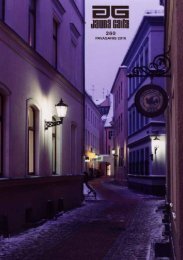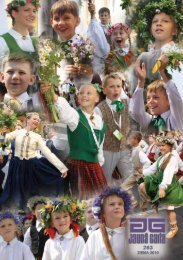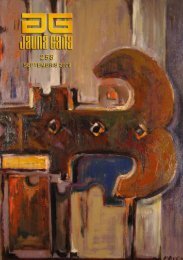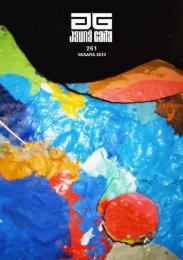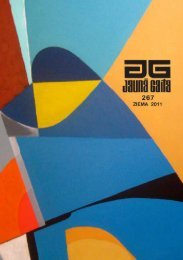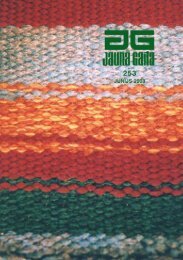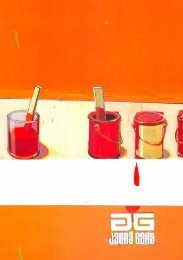dažos vÄrdos - Jura ŽagariÅa mÄjas lapas
dažos vÄrdos - Jura ŽagariÅa mÄjas lapas
dažos vÄrdos - Jura ŽagariÅa mÄjas lapas
Create successful ePaper yourself
Turn your PDF publications into a flip-book with our unique Google optimized e-Paper software.
IN THIS ISSUE<br />
LETTERS AND THE VISUAL ARTS. Our<br />
featured younger generation poet, Jānis<br />
Vādons, at home in Rīga, says of himself: I<br />
am connected to life, to dreams and to visions.<br />
This connectedness and the (in)coherence<br />
of it is what I express in my poetry.<br />
••• Leons Briedis poetically bemoans the<br />
failure of the people to elect leaders such<br />
as Demosthenes, ancient Greek paragon of<br />
statesmanship, regularly opting instead for<br />
some populist demagogue from their own<br />
midst, who turns monstrous in a position<br />
of power. ••• Koknese (Kokenhusen) is<br />
a town on the Daugava, about 100 kilometers<br />
upstream from Rīga. It contains a park<br />
around the ruins of a 13 th century castle,<br />
which, until the end of the 17 th century,<br />
when it was destroyed in the Great Northern<br />
War, was a residence of the archbishop<br />
of Rīga. In the late 19 th century, Baltic German<br />
Baron von Löwenstern built a magnificent<br />
manor house nearby, soon destroyed<br />
in the Revolution of 1905. Koknese is also<br />
the home town of writer Laima Kalniņa,<br />
who shares her meditations on these historic<br />
upheavals in the context of her own<br />
childhood memories in a story titled “A Beginning”.<br />
••• Our spring issue is graced<br />
with reproductions of exuberantly colorful<br />
abstract paintings by Leons Samulis and<br />
Ila Kellermane as well as black and white<br />
photographs by Aina Balgalve, Raimo Lielbriedis<br />
and Ramona Kalniņa. To commemorate<br />
the reunification of Germany twenty<br />
years ago, Rolfs Ekmanis shares a color photograph,<br />
taken in 1987, of a bit of inspired<br />
graffiti on the west side of the Berlin Wall.<br />
••• Commenting on an exhibit of the art<br />
of Stass Paraskos in Leeds, England, Laimonis<br />
Mieriņš recounts how, some thirty years<br />
ago, the Cypriot artist precipitated a scandal<br />
by exhibiting there. ••• Vilnis Auziņš<br />
reports on Design Awards for photography.<br />
The Latvian Designers Society instituted this<br />
award for the first time in 2009.<br />
LITERARY COMMENT. Vita Gaiķe presents<br />
Lolita Gulbe, the winner of the Ēriks Raisters<br />
Memorial award for 2009. Gulbe is a<br />
poet who has contributed much to Jaunā<br />
Gaita and has published seven collections<br />
of her work. ••• Literary scholar Eva<br />
Eglāja-Kristsone continues her serialized account<br />
of the dynamics of cultural contacts<br />
between Latvians in the home country and<br />
Latvians in political exile during the Cold<br />
War, covering the years 1980-1987 when<br />
initiatives on the Soviet side were waning in<br />
awareness of looming geopolitical change.<br />
••• Herta Müller, the winner of the Nobel<br />
Prize in literature in 2009, rejects the notion<br />
that choice of language is important, prefers<br />
to live in exile and considers writing an<br />
act of exorcism. Irēne Avena characterizes<br />
her as an unsentimental truth teller whose<br />
art is a musical counterpoint of repeated<br />
staccato sentences using varying instrumentation.<br />
••• Marta Landmane’s poetry<br />
is simple and straight-forward, her words<br />
are powerful, never exaggerated. Sarmīte<br />
Janovska-Ērenpreisa recounts Landmane’s<br />
career to date.<br />
ACTUALITIES, HISTORY, MEMORIES. In the<br />
first of three installments on higher education,<br />
Prof. Gundars Ķeniņš Kings focuses<br />
on the US. ••• Dzintars Edvīns Bušs, an<br />
environmental ecology expert living in Rīga,<br />
contributes a broad-brush analysis of the<br />
causes for the ongoing global economic<br />
crisis. ••• Tireless foe of all sources of<br />
disinformation, Franks Gordons, tackles the<br />
Russian Institute for Democracy and Cooperation<br />
in Paris. ••• Uldis Siliņš continues<br />
his laughing-through-the-tears memoir<br />
of post-war refugee-camp life in Alt-Garge,<br />
Germany. Someone catches scarlet fever<br />
and all 18 barrack-mates have to be quarantined<br />
in eight rooms in a residence away<br />
from camp. Paradise! exclaims Siliņš. •••<br />
The Marginalia section, as usual, does not<br />
fail to surprise and delight with news shorts<br />
from all over the world.<br />
REVIEWS. Agate Nesaule’s novel In Love<br />
with Jerzy Kosinski (reviewed by Biruta<br />
Sūrmane) • Volumes 2 & 3 of Aina Zemdega’s<br />
collected works Raksti (Juris Silenieks)<br />
• Jānis Lejiņš’ historical trilogy Zīmogs<br />
sarkanā vaskā (Dzidra Purmale) • Gundega<br />
Grīnuma’s Piemiņas paradoksi – on commemorating<br />
Rainis’ and Aspazija’s Swiss<br />
exile (1906-1920) in Castagnola (Aina Siksna)<br />
• Eva Eglāja-Kristsone’s and Benedikts<br />
Kalnačs’ (eds) Back to Baltic Memory: Lost<br />
and Found in Literature, 1940-1968 (Rolfs<br />
Ekmanis) • Rasma Grīsle’s linguistic study<br />
Heterotonu vārdnīca un heterotonijas pētījumi<br />
(Lalita Muižniece) • Daiga Joma’s short<br />
stories Dvēseles bezvējš (Amanda Jātniece)<br />
• Kristiina Ross’ un Pēteris Vanags’ (eds)<br />
Common Roots of the Latvian and Estonian<br />
Literary Languages (Jānis Krēsliņš, Sr.) • Ilgvars<br />
Veigners’ Latvieši rietumzemēs – an encyclopaedic<br />
work on Latvian communities<br />
outside their home country (Valters Nollendorfs)<br />
• Pauls Toutonghi’s Red Weather<br />
(the German version) (Biruta Sūrmane) •<br />
September 2009 Journal of Baltic Studies<br />
(Gundars Ķeniņš Kings).<br />
jž



